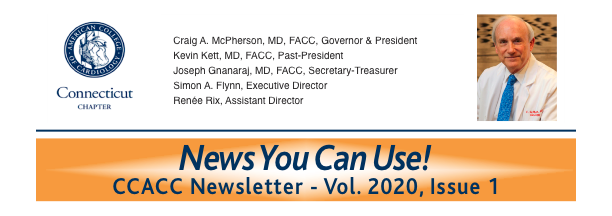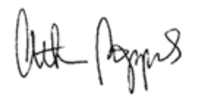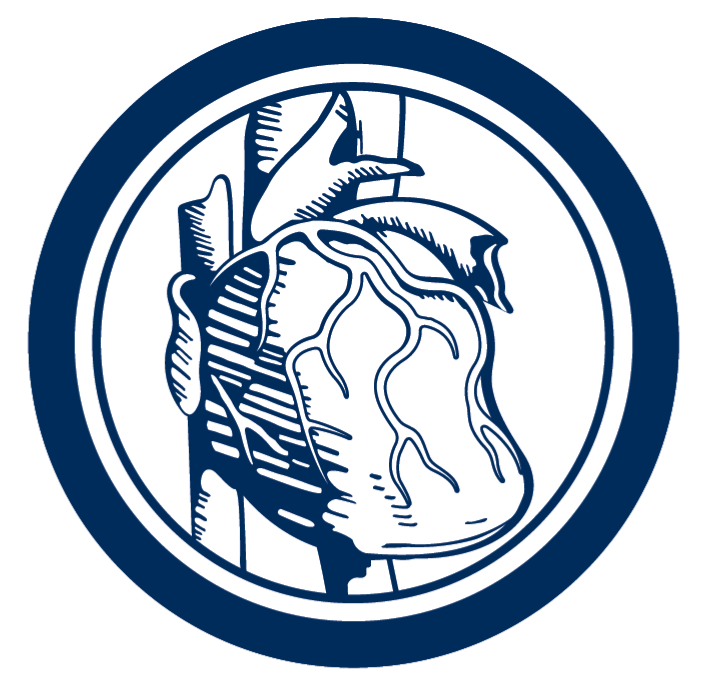News
CACC Newsletter – Vol. 2020, Issue 1
Greetings from the “Gov”:
Greetings, from the newly minted President of the Connecticut Chapter of the American College of Cardiology (hereafter, simply the CCACC). I recently began an e-mail to hospital colleagues with the following comments (I apologize to those for whom this is repetitious):
Have you ever read A Tale of Two Cities, by Charles Dickens? If not (or if you may have forgotten), here’s a start, the famous opening line:
It was the best of times, it was the worst of times,
It was the age of wisdom, it was the age of foolishness,
It was the epoch of belief, it was the epoch of incredulity,
It was the season of Light, it was the season of Darkness,
It was the spring of hope, it was the winter of despair….”
One can argue that we are living in the worst of times, certainly of the times we have all known. The COIVD-19 pandemic is novel, noxious, nerve-racking and never ending (seemingly);
also, stressful, very stressful. Each phase presents new challenges, as the grand “reopening” has begun.
I invite you all to click on the following link. It connects to the ACC physician well-being resource site.
The material there will take you less than 5 minutes to peruse, but, it may prove helpful to deal with these “worst of times.”
The link:
ACC COVID-19: Resources For Clinician Well-Being https://www.acc.
So, here we all are, trying to find and fight our way through the worst pandemic in a century, the worst global economic collapse in modern times and the greatest social upheaval since at least the 1960s (if not the 1860s). If you’re feeling more than a little stressed, congratulations, you are normal; if not, check your pulse. I have no balm of Gilead to offer, no panacea, no disinfectant, no perfect solutions. What I can offer is some sense of normalcy – what I hope to be a periodic CCACC Newsletter –this being Volume 2020, issue #1. With this I hope to provide, some pertinent information and, perhaps, a little inspiration. That said, here is some news.
An account of the first (and, hopefully, last) virtual Annual Meeting of the CCACC:
The 28th Annual Meeting of the Connecticut Chapter of the American College of Cardiology was held on the evening of May 27, 2020. Due to restrictions on public gathering imposed by the COVID-19 pandemic, the meeting was held as a virtual event on the Zoom platform.
Business meeting:
Chapter business was discussed from 6:00 PM until 6:30 PM.
Dr. Kevin Kett, ending his 3-year term as chapter Governor and President, offered some remarks on the chapter’s evolution in recent years. He made specific reference to the following:
- Financial difficulties mounted in approximately 2010. Dr. Edward Tuohy came to the chapter’s rescue in 2010 by floating a loan to help maintain the organization’s solvency. Dr. Kett thanked Dr. Tuohy for his financial lifeline, for his excellent service as chapter Governor/President from 2014 to 2017 and for his continued service to the CCACC on the Education Committee and Council as well as his service on the RVU Committee of the national ACC.
- Chapter finances improved in the period of 2017 through 2020 due to an increase in member dues, generous support from corporate sponsors at the Annual Meeting (they will be listed and thanked on the CCACC web site) and a revamping of the Annual Meeting format, which improved attendance. The latter changes were largely due to the creation of the ad hoc Education Committee, formed under the guidance of Dr. Gil Lancaster and co-chaired by Dr. Craig McPherson and Kristin Bott, APRN, DNP from 2017 through 2020.
- Dr. Kett thanked Dr. Lancaster for his leadership as chapter Governor/President from 2011 to 2014, during which time chapter focus on public education resulted in Connecticut legislation that mandated CPR instruction for all public high school students, for forming and serving on the Education Committee and for his ongoing service on the Health Affairs Committee of the national ACC.
- Dr. Kett thanked members of the Council who, in addition to Dr. Lancaster, have ended their service: Dr. Lynda Rosenfeld, Yale University, who will be retiring as of June 30, 2020; and Dr. Anita Kelsey, St. Francis Hospital, who left to accept a position at Duke Medical Center in 2019.
- Dr. Kett thanked Dr. McPherson, Kristen Bott and Dr. Malm for their leadership of the Education Committee, which has overseen very successful (financially and scientifically) annual meetings since 2016. He then welcomed Dr. McPherson as chapter President (he had become chapter Governor as of the ACC Virtual Meeting held at the end of March 2020).
Dr. Joseph Gnanaraj, chapter Secretary-Treasurer, and Simon Flynn, Chapter Executive Director, provided a brief report of the chapter’s finances (full report will be posted on the chapter website). Chief points were as follows:
- Chapter account balance on January 1, 2019……………………………….. $ 50,525
- Chapter account balance on December 31, 2019 ……………………….….. $ 73,082
- Chapter revenue in 2019……………………………………………………… $ 95,404
- Chapter expenses 2019 …………………………………………………………$ 74,852
- Chapter net revenue 2019 ………………………………………………………$ 22,557
Dr. McPherson welcomed all who had joined the meeting. He reviewed the status of Council membership, including the following information.
Council membership as of April 1, 2020 (departing members indicated in italic font)
- Dr. Edward Tuohy, Immediate Past President – term ending (Interventional Card/Bridgeport)
- Dr. Kevin Kett, President/Governor (Interventional Card/Waterbury)
- Dr. Craig McPherson, President-elect, Co-chair, Education Committee (Card EP/Bridgeport)
- Dr. Joseph Gnanaraj, Secretary-Treasurer (Clinical Card/Waterbury)
- Dr. Anita Kelsey – resigned to accept new position in North Carolina (Clinical Card/Hartford)
- Dr. Seth Lapuk (Pediatric Card/Danbury)
- Dr. Gilead Lancaster – term ending (Clinical Card/Bridgeport)
- Dr. Lynda Rosenfeld – retiring (Card EP/New Haven)
- Kristen Bott, APRN, DNP (Stamford) – CVT rep.
- Gloria Bindelglass, BSN, RN, CEN, CCRN-CMC (Bridgeport) – CVT rep
- Dr. Kerrilynn Carney, 3rd year fellow, Yale – term ending due to graduation –FIT rep.
- Dr. Patrick Gottimer, 2nd year fellow, Danbury Hospital – FIT rep.
Proposed Council membership for term beginning June 1, 2020 (proposed new members in italic font)
Officers:
- Dr. Kevin Kett, Immediate Past President (Interventional Card/Waterbury)
- Craig McPherson, President / Governor (Card EP/Bridgeport)
- Dr. Joseph Gnanaraj, Secretary-Treasurer (Clinical Card/Waterbury)
CV team representatives:
- Kristen Bott, APRN, DNP; Co-chair, Education Committee (Stamford)
- Gloria Bindelglass, BSN, RN, CEN, CCRN-CMC (Bridgeport)
FIT representatives:
- Dr. Patrick Gottimer, rising 3rd year fellow, Danbury Hospital
- Dr. Steffne Kunnirickal, rising 2nd year fellow, Yale New Haven Hospital
Councilors:
- Dr. Paige Brennan, MD (Card EP/Norwich)
- Dr. Irma Fotjadhi (Clinical Card & Cardio-Onc/Bridgeport)
- Dr. Eric Grubman (Card EP/ New Haven)
- Dr. Carol Gemayel-Barra (Clinical Card/Danbury)
- Dr. David Hsi (Clinical Card & Cardio-Onc/ Stamford)
- Dr. Seth Lapuk (Pedi Card/Danbury)
- Dr. Brian Malm, Co-chair, Education Committee (Clinical Card/ West Haven VA & Yale)
- Dr. Sean McMahon (Clinical Card/Hartford)
- Dr. Colleen Pietras (Card Surgery/Bridgeport & New Haven)
- Dr. Sara Tabtabai (Heart Failure / UConn)
Scientific Meeting:
Dr. Brian Malm and Dr. Kerrilynn Carney presided over the abstract presentations.
40 abstracts had been submitted. All were reviewed and graded by a panel of physicians that included:
- Dr. Brian Malm (Yale)
- Dr. Craig McPherson (Bridgeport)
- Dr. Ira Galin (Danbury)
- Dr. Peter Schulman (U Conn)
- Dr. Parul Ghandi (Yale)
20 abstracts (5 original research and 15 case vignettes) were originally accepted for presentation at the Annual Meeting. Once COVID-19 –related restrictions were enacted and the meeting was converted to remote, virtual format, it was decided to present the 10 that had garnered the highest scores from the review panel. One of the presenters had to withdraw (due to reassignment to COVID-19 patient care coverage). The 11th best scoring abstract was then included for presentation. When a co-author of the omitted abstract came forward to present the paper, it was re-included in the list of presented works. Thus, 11 abstracts were presented, each as a PowerPoint presentation. All were loaded by Dr. Malm into a single file, thereby allowing him to advance slides (and point to areas of slides that required emphasis). This minimized the amount of screen sharing that was required and providing a smoothly flowing series of presentations, each of about 5 minutes duration followed by 2 to 4 minutes of audience questions. The presentations flowed flawlessly without a single technical problem! Dr. Carney monitored presentation time and the chat room for audience questions. She and Dr. Malm did an excellent job permitting a maximum number of question responses in a minimum amount of time. The presentations began at 6:15 pm and concluded at 8:20 PM. During that time, audience attendance ranged from 40 to 45 individuals.
Each presenter will be mailed a $50 AmEx gift card in token of their effort and excellent work.
The 11 presented abstracts were as follows:
|
|
|
|
|
|
|
|
Second, for those of you who are contemplating taking board exams (or simply want to stay up-to-date in your cardiologic knowledge), here is information from ACC about a new educational offering:
ACC is excited to announce a whole new board prep virtual experience — ACC Cardiovascular Overview and Board Prep Virtual Experience! This brand-new offering provides a GUIDED and ENGAGING
The Cardiovascular Board Prep includes:
- A Study Roadmap. Receive a 16-week plan that breaks the board exam content down by content category and provides guidance on what to study each day to keep you on track to pass the exam.
- Interactive Opportunities with Expert Faculty. Each week participate in a live webinar with our expert faculty to review study topics and ask questions. Plus, submit written questions throughout the week and get timely feedback from the faculty.
- Unlimited Access to ACCSAP, Heart Songs 5 and ECG Drill & Practice (until Oct. 31, 2020). This trio of ACC products provides the ultimate study tool — learn from educational text and lectures, simulate taking a Board exam, practice with hundreds of ABIM-style questions, and identify your knowledge gaps so you can plan additional study. Plus, improve your auscultation skills with Heart Songs 5 and hone your ECG interpretation skills with ECG Drill & Practice.
ACC is providing this education and more at the remarkable price of $299 for members! To learn more and purchase today, visit ACC Cardiovascular Overview and Board Prep Virtual Experience.
[No, neither I nor any member of CCACC receives any commission for those who enroll! ~C. McP]
A little inspiration (maybe):
First, a confession: I am an old white guy born in Manhattan, weaned in Brooklyn and bread in Fairfield, CT. Like many (most) of you, I’m a highly educated product of fine primary, secondary, collegiate and post-graduate schools. I went to church school, pray most (well, some) Sundays, was married for 42 years (until my wife died of a ruptured thoracic aneurysm while skiing in February 2018 – previously undiagnosed bicuspid aortic valve), raised 2 daughters who are fine, professional women and I tend to be liberal in my social beliefs and political leanings. And, oh yes, I have an implicit bias against people who look different than me – black and brown people. I know this is true – I took the test, so can you; I recommend that you do. It’s the Harvard Implicit Association Test, available at implicit.harvard.edu). Of this truth, I am ashamed, especially now. I am not alone in this truth. That does not excuse it, or assuage my guilt. If you have not read much about implicit bias, you should. And this would be a good time to do so. The ACC published a brief, very informative article on the subject in the January 2020 issue of Cardiology. It’s clearly one of the forces that create tension, distrust and friction between people. The key points: 1) “implicit bias” is not the same as “explicit”, or overt, bias; 2) “implicit bias” is neither bad nor good – it’s simply a part of each and every one of us; and 3) the first step in overcoming the negative effects of implicit bias is to recognize its presence and its manifestations; then, and only then, can one take steps to overcome its repercussions. The article in Cardiology discusses this in greater (but not exhaustive) detail – I commend that article to all of you. Here is a link to it:
https://www.acc.org/latest-in-
If you’d like some other resources, you’re white like me, you would like to achieve a deeper understanding of what non-white people are feeling these days (and have been feeling for centuries) and you have the capacity for empathy (I know you do), I’d like to suggest some resources that were recently recommended by Reverend Leah Lyman Waldron, a minister that I know, in a message to her congregation. With her permission, I herein quote the pertinent passage from her message:
“A few books to get you started: So You Want to Talk about Race; Stamped from the Beginning (recommended to me by UCC president & general minister John Dorhauer); How to Be an Antiracist; White Fragility; Just Mercy; Be the Bridge; Me and White Supremacy; Waking Up White. If you are white and have never engaged in anti-racism education before, I’d recommend starting with Waking Up White.
A few social media accounts to get you started (these are Instagram but you can find many of these accounts on Twitter or Facebook as well): Osheta Moore, Anabaptist pastor and anti-racism encourager; The Conscious Kid, for parents looking to educate their children on anti-racism; Latasha Morrison, author of Be the Bridge; Rachel Cargle, curator of The Great Unlearn; Ibram X. Kendi, author of Stamped from the Beginning and How to Be an Antiracist; Brittany Packnett Cunningham, co-founder of Campaign Zero; and author, activist, and educator Sonya Renee Taylor. There are many more!
If you are white, check in on black friends and coworkers. Ask how you can support them. This is an incredibly painful and exhausting time for our brothers and sisters of color. Heads up: this is NOT the moment to share how you are feeling with your friends of color. Instead consider saying: “I am thinking of you. How are you holding up? How can I support you?” and then follow up on what they suggest. Also, commit to having hard conversations about race with other white people in your life. It can be intimidating and uncomfortable to talk about race, but silence from white people is the number one thing keeping racism alive and well. The more you learn, the more empowered you’ll feel to have those conversations – and the less of a burden there will be on people of color to be the ones educating our white friends, relatives, neighbors, and coworkers.”
I opened with Dickens, I’ll close with Joel (Billy, that is, from his song, “Keeping the Faith”):
“You know the good ole days weren’t
Always good
And tomorrow ain’t as bad as it seems….
I’m keeping the faith.”
These are troubled times, just like Dickens described at the dawn of the French revolution. It sounds hard to simultaneously reach out and stay apart, but, we can do that! Treating a hitherto unknown disease in at times overwhelming circumstances has taught us the true depth of our resilience, our capabilities and our humanity. As our state inches back towards “normal,” whatever that turns out to be, our patients will continue to look to us all for guidance, for health and for hope. We need to stay smart, stay strong, stay healthy and stay connected. We who work with the CCACC are committed to the latter. If you have news or views, please let us know and we will try to spread the word. We are all the Cardiology Community of Connecticut. We are all doing our best. We are all contributing. Godspeed to all of you, and keep the faith.
Warmest regards,
~Craig
Craig McPherson, MD, FACC
Chapter Governor & President
Director, Cardiac EP Service
Director, Cardiology Fellowship Program
Bridgeport Hospital
Clinical Professor of Medicine
Yale University School of Medicine
Phone: 203-384-3442
FAX: 203-384-3443







